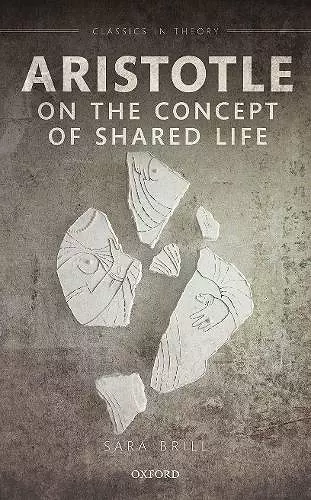Aristotle on the Concept of Shared Life
Format:Hardback
Publisher:Oxford University Press
Published:28th May '20
Currently unavailable, and unfortunately no date known when it will be back

According to the terms of Aristotle's Politics, to be alive is to instantiate a form of rule. In the growth of plants, the perceptual capacities and movement of animals, and the impulse that motivates thinking, speaking, and deliberating Aristotle sees the working of a powerful generative force come to expression in an array of forms of life, and it is in these, if anywhere, that one could find the resources needed for a philosophic account of the nature of life as such. Aristotle on the Concept of Shared Life explores this intertwining of power and life in Aristotle's thought, and argues that Aristotle locates the foundation of human political life in the capacity to share one's most vital activities with others. A comprehensive study of the relationality which shared life reveals tells us something essential about Aristotle's approach to human political phenomena; namely, that they arise as forms of intimacy whose political character can only be seen when viewed in the context of Aristotle's larger inquiries into animal life, where they emerge not as categorically distinct from animal sociality, but as intensifications of it. Tracing the human capacity to share life thus illuminates the interrelation between the zoological, ethical, and political lenses through which Aristotle pursues his investigation of the polis. In following this connection, this volume also examines — and critically evaluates — the reception of Aristotle's political thought in some of the most influential concepts of contemporary critical theory.
...the work in question is remarkable for the finesse of its analyzes and the knowledge of its subject (in this case the texts) and, above all, the solidity of his argument. * Pierre Pellegrin, CNRS, Revue Des Etudes Anciennes *
It may well succeed, however, in its goal of opening up rather than foreclosing engagement with Aristotle's texts among students of contemporary critical theory. * David J. Riesbeck, Purdue University, West Lafayette, Indiana, THE REVIEW OF POLITICS *
I suspect that those engaged in the Continental tradition will find this work highly engaging and thought-provoking. Criticaltheorists should likewise benefit from Brill's excavation of Aristotle's concept of zoē and its delineation from his notion of bios. * William B. Cochran, Harvard University, Polis *
In the final analysis, this is an important and engaging book, which moves on the field of Aristotelian bio-politics significantly. Amongst its many strengths are how beautifully it is written, its powerful command of numerous less explored Aristotelian texts, and its sensitive realignment of Aristotelian political philosophy. * Sophia Connell, The Philosophical Quarterly *
a book for graduate students and specialists in philosophy and classics. Brill engages with the secondary literature primarily by identifying where to look for supporting, competing, or supplementary views. * Daniel P. Maher, Bryn Mawr Classical Review *
It is extremely rich and enlightening, offering important philosophy that is both deeply rooted in history and highly relevant to the present. * Zoli Filotas, Journal of the History of Philosophy 61.1 *
ISBN: 9780198839583
Dimensions: 222mm x 144mm x 19mm
Weight: 472g
296 pages